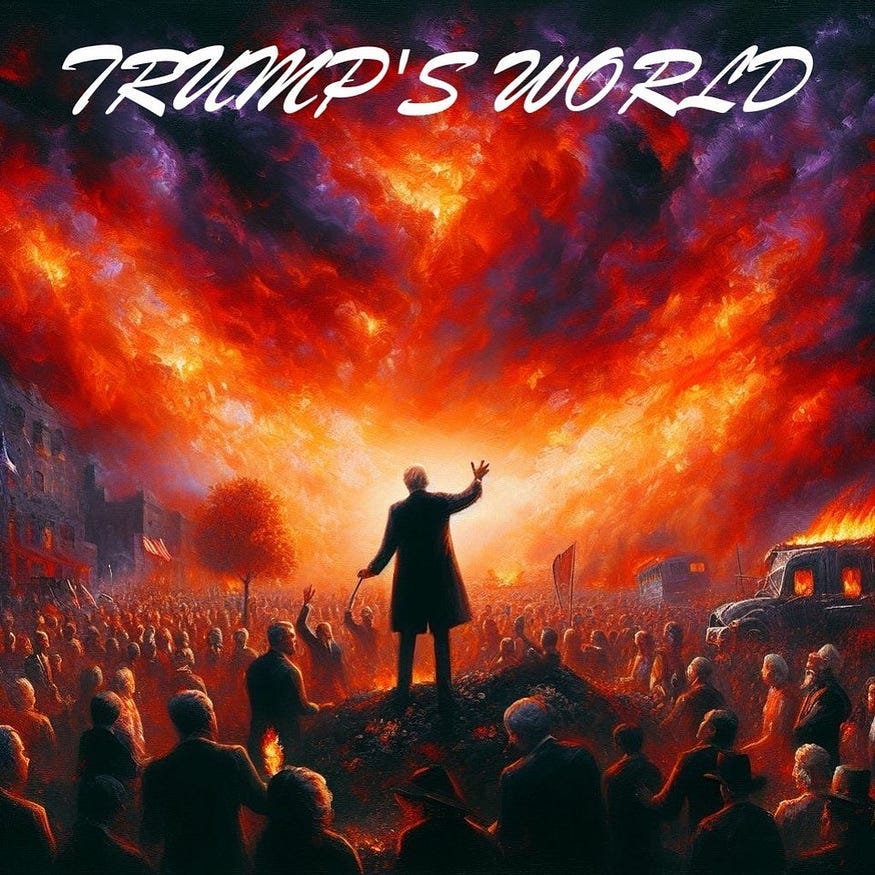Trump’s Monstrous Destruction of Democracy
A Discussion of Democracy
By far, the most frightening aspect of Donald Trump’s continued efforts to regain power is his follower’s willingness to throw out democracy as a concept by which to be governed and choose instead an authoritarian bully, bigot, and overall malignant narcissist as our leader. It has been reported that Eisenhower said of members of the far-right, “These people have always been with us, and they are stupid.” So again, Trump’s followers are the problem, making him the Leader of The Problem and the Stupid. It really is as simple as that.
The concept of democracy is an ancient idea tried in many different forms. The most common definition of democracy is founded on the idea of government, which is empowered by citizens or through their representation. In this way, democracy differs from other forms of government, such as theocracies and autocratic nations, and all other forms of government not empowered by the citizens. But even America’s founders were worried about giving us a true democracy, straight-up, one person, one vote, the majority rules concerning the minority — thus a system convoluted by an electoral college and a history of just who does and who does not get to vote has always been with us. In America today, in our political polarization, we see a looming threat to democracy and a malignant narcissist like Trump showing us how far down he can drag us.
One can easily understand this concept when one examines the countries which are not democratic. For example, many of the countries of the Middle East are theocracies. These countries typically have ruling families and laws dictated by religious beliefs that remove the equality that a genuine democracy should always be trying to increase.
Another example would be communist China. In China, the government is controlled by a party that chooses leaders and makes laws. The citizens of China have little to do with the government processes. Often, democratic and nondemocratic systems are compared qualitatively, and many scholars agree that despite their inherent issues, democratic systems of government seem to be the most effective and efficient forms of government. However, more important than efficiency and effectiveness are the broad principles of fairness, justice, and equality of opportunity only present in a democracy — these values and principles are threatened by people who do not understand the preciousness of such values. Trump leads the nation of Stupidville, people without depth nor the capacity to change that in themselves.
What makes genuine democracy the best form of government is its ability to consider many different viewpoints and opinions. This factor, directly caused by the nature of democracy, forms political parties that represent many varying beliefs and desires of citizens. The United States is considered a two-party system where almost every elected office is occupied by democratic or republican party members. These two parties have dominated American politics for most of US history. The two-party system is a uniquely democratic political structure existing in most democratic nations. The two-party system in the US has many benefits and drawbacks to its structure.
The two-party system in the United States developed due to voting structure and election outcomes. The voting structure in American politics favors large numbers of constituents, i.e., large numbers of voters in favor of one representative and the ideas and positions of this representative. In contrast to the two-party systems, in a multiparty system, the voting power is spread across many candidates, thus reducing the likelihood of any single candidate achieving victory. Because the voting structure of the American political system is based on one person achieving victory, this structure breeds a two-party system because voters have a better chance of achieving their goals by being united under one candidate who best represents their interests. For instance, immigration is a controversial topic that divides many Americans. Even within political parties, the issue of immigration is controversial and divides members. As a result of this schism in opinion concerning immigration, voters may or may not vote in line with one of the parties. Typically, the party most closely sharing the voter's interest wins their vote.
The satisfaction of interests with voters is the driving force in voter decision-making. This factor allows leadership to evolve and alter political positions to satisfy the demands of constituents. As a result of the two-party system, issues result in compromises of interests. The voters are forced, in many cases, to vote not for the candidate that fully represents their interest but rather the candidate that ‘best’ represents their position. For this reason, many issues continue to be controversial and are often undecided or fail to satisfy the population. The effectiveness of democratic policymaking is arguable, but it is functional and effective.
Of course, there are many other systems of democracy than just the two-party system. Parliamentary democracy gives voters more choices and often depends upon negotiated alliances between smaller parties with enough shared interests to govern together. America’s first President, George Washington, opposed two parties and felt that in a POTUS election, the winner should be POTUS and the loser should be VP, bringing together both sides for the betterment of all. Democracy with a capital D can exist in many forms, but the essential ingredient is that the governed choose their leadership rather than being forced or coerced into obeying leaders that the governed had no say in selecting.
When a system of government is nondemocratic, it becomes less flexible and ultimately less effective due to a single person or small party making decisions without the benefit of opinion or criticism. Due to the nature of non-democratic systems, they often refuse to hear citizens and often outlaw criticism.

A perfect example of this type of problem appears in Trofim Lysenko. Lysenko was a biologist who convinced Stalin during the USSR that his pseudoscientific concepts concerning agriculture were correct. Lysenko’s ideas were endorsed by the communist party of Russia, barring scientific advancement for nearly forty years during the reign of Stalin. Because of his popularity with the government, Lysenko was protected from criticism by other scientists. As Lysenko advanced in position, he silenced adversaries through intimidation and fear. The long-term effect of Lysenko was a halt to scientific advancement in biology and agriculture within the Soviet Union.
Not only did advancement halt in the field of biology, the government wasted an incredible amount of resources. Because Lysenko did not follow proper scientific protocols, experiments were conducted that wasted time and carried little logical purpose. For instance, Lysenko spent inordinate amounts of time growing crops in geometric configurations, attempting to prove that plant life could be affected in this manner. But because of Lysenko’s position, no one challenged his thinking. Many scientists were imprisoned or killed for criticizing Lysenko. The Lysenko situation would have been much more difficult in a democratic nation where debate is allowed and promoted.
When one takes a broad view of nondemocratic nations, invariably, these nations have weak economies, unstable governments, high numbers of human rights violations, and lower standards of living. Democratic governance, as supported by the United Nations, is based on the freely expressed will of the people to determine their own political, economic, social, and cultural systems and their full participation in all aspects of their lives. Democracy design intends to uphold and advance the respect of individual rights, realize fairness in society, encourage the community’s economic and social growth, fortify societal unity, boost national harmony, and establish an environment conducive to global peace. In turn, democracy provides an environment for the protection and effective realization of human rights, which is essential for individuals to contribute to their society’s growth and development.
The recent uprisings in the Middle East are also evidence of the ineffectiveness of non-democratic systems. At the heart of the revolts in places such as Tripoli and Egypt have been issues such as government accountability and transparency in government. Many of these countries have weak economies due to governments that will not budge from their positions. In Egypt, one of the primary rebellion causes was cited as “It is a common trend in Arab politics that the most volatile outbreaks of unrest come when you have a conjunction between a closed political system, economic downturn, an aging president and a large young population.”
These historical examples prove many things regarding nondemocratic nations being less effective than democratic nations. The examples also show that even though democratic systems have flaws, these nations provide a greater degree of stability both politically and economically. When the government controls to the point of intolerance to debate, advancement is undermined. This history is compelling evidence that for nations to be effective and efficient, there must be some latitude of freedom and control by citizens or their representatives.
Donald Trump won an electoral college victory with nearly three million fewer votes than his opponent, Hilary Clinton, in 2016 by lying and appealing to the darkest impulses of American bigotry, racism, and anti-democratic beliefs. He lost the presidency by nearly seven million fewer votes in 2020 than his opponent but has denied he lost, a Big Lie, since refusing to concede he lost. He broke many laws asserting his right to retain the presidency despite his loss. Trump is absolutely willing to discard all democratic processes in his quest to hold onto power at all costs and continues to demand power with appeals to anti-democratic segments of Americans. His actions tell us all we need to know about how dangerous he and his followers are to democracy.





Great article and nod over to the bigotry of trump, as if I were not already terrified! As he slithers through the judiciary system now with no accountability in sight, it seems he's turned the experience with his dad into a way of life that will destroy our lives.